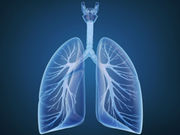Benralizumab significantly reduces exacerbations, two trials show
WEDNESDAY, Sept. 7, 2016 (HealthDay News) — Benralizumab, a humanized, afucosylated, anti-interleukin-5 receptor α monoclonal antibody, reduces exacerbations in patients with severe, uncontrolled asthma and elevated blood eosinophil counts, according to two studies published online Sept. 4 in The Lancet. The research was published to coincide with the annual European Respiratory Society International Congress, held from Sept. 3 to 7 in London.
In the first trial, 1,306 patients aged 12 to 75 were randomly assigned to one of three groups: benralizumab every four weeks; benralizumab every eight weeks; or a placebo. Participants continued to use high-dose inhaled corticosteroids and long-acting β2-agonists to control their asthma. Over 52 weeks, the researchers found that patients taking benralizumab had a 28 to 36 percent reduction in exacerbations, compared with placebo. Patients on benralizumab also showed improved lung function. The most common side effects were nasopharyngitis and worsening asthma.
In the second trial, 1,205 patients were assigned to similar groups as in the first trial. The researchers found that benralizumab reduced exacerbations by 45 to 51 percent, compared with a placebo. The most common side effects were worsening asthma in 13 percent of those receiving benralizumab, and nasopharyngitis, experienced by 12 percent of patients.
“These results confirm the efficacy and safety of benralizumab for patients with severe asthma and elevated eosinophils, which are uncontrolled by high-dosage inhaled corticosteroids plus long-acting β2-agonists, and provide support for benralizumab to be an additional option to treat this disease in this patient population,” the authors of the second study write.
The studies were funded by AstraZeneca, the maker of benralizumab. FitzGerald reports serving as a consultant to AstraZeneca.
Full Text 1 (subscription or payment may be required)
Full Text 2 (subscription or payment may be required)
Editorial (subscription or payment may be required)
Copyright © 2016 HealthDay. All rights reserved.








